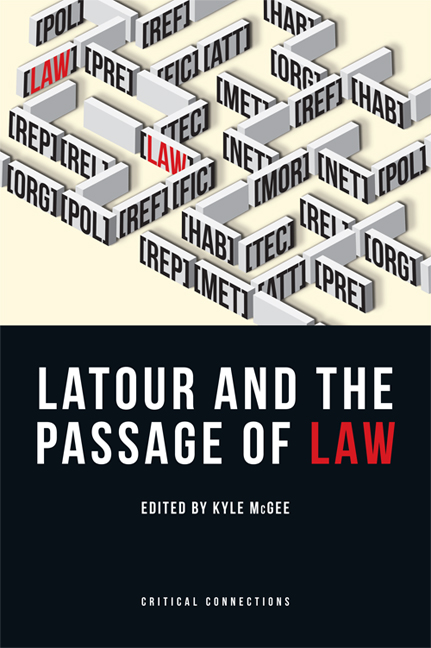Book contents
- Frontmatter
- Contents
- Introduction
- 1 From the Conseil d’État to Gaia: Bruno Latour on Law, Surfaces and Depth
- 2 Politics and Law as Latourian Modes of Existence
- 3 On Devices and Logics of Legal Sense: Toward Socio-technical Legal Analysis
- 4 ‘The Crown Wears Many Hats’: Canadian Aboriginal Law and the Black-boxing of Empire
- 5 Providing the Missing Link: Law after Latour's Passage
- 6 The Life and Deaths of a Dispute: An Inquiry into Matters of Law
- 7 Plasma! Notes on Bruno Latour's Metaphysics of Law
- 8 The Conditions of a Good Judgment: From Law to Internal Affairs Police Investigations
- 9 In The Name of the Law: Ventriloquism and Juridical Matters
- 10 Laboratory Life and the Economics of Science in Law
- 11 Bartleby, Barbarians and the Legality of Literature
- 12 The Strange Entanglement of Jurimorphs
- List of Contributors
- Index
5 - Providing the Missing Link: Law after Latour's Passage
Published online by Cambridge University Press: 05 September 2016
- Frontmatter
- Contents
- Introduction
- 1 From the Conseil d’État to Gaia: Bruno Latour on Law, Surfaces and Depth
- 2 Politics and Law as Latourian Modes of Existence
- 3 On Devices and Logics of Legal Sense: Toward Socio-technical Legal Analysis
- 4 ‘The Crown Wears Many Hats’: Canadian Aboriginal Law and the Black-boxing of Empire
- 5 Providing the Missing Link: Law after Latour's Passage
- 6 The Life and Deaths of a Dispute: An Inquiry into Matters of Law
- 7 Plasma! Notes on Bruno Latour's Metaphysics of Law
- 8 The Conditions of a Good Judgment: From Law to Internal Affairs Police Investigations
- 9 In The Name of the Law: Ventriloquism and Juridical Matters
- 10 Laboratory Life and the Economics of Science in Law
- 11 Bartleby, Barbarians and the Legality of Literature
- 12 The Strange Entanglement of Jurimorphs
- List of Contributors
- Index
Summary
[On] ne peut parler juridiquement sans etre juge.
(Bruno Latour 2002: 273)Ce qui m'interesse ce n'est pas la loi ni les lois (l'une est une notion vide, les autres, des notions complaisantes), ni meme le droit ou les droits, c'est la jurisprudence. C'est la jurisprudence qui est vraiment creatrice de droit : il faudrait qu'elle ne reste pas confiee au juges. Ce n'est pas le Code civil que les ecrivains devraient lire, mais plutot les recueils de jurisprudence.
(Gilles Deleuze 1990: 229–30)Every time a person interprets some event in terms of legal concepts or terminology – whether to applaud or to criticize, whether to appropriate or to resist – legality is produced.
(Patricia Ewick and Susan Silbey 1998: 45)Introduction
There are two ways to speak of the law, which, both for jurists and laypersons, coexist like an optical illusion. Either you see the naked young woman, or you see Freud's profile, and the passage from one view to the other is difficult to grasp or control. You're caught ‘in’ the one or ‘in’ the other. Similarly, law is evoked in two modes referring to two distinct significations. On the one hand law is referred to as an intertwined whole of statutes, rules and regulations, and thus, in one word, as norms (or ‘normativity’), while, on the other hand, it can as well be understood as decision-making or as a practice that produces solutions. Thus: norms or solutions, that's the question.
While it is not clear how we have been mixing up and shifting from the one register to the other, we surely have. In fact – and maybe this is clearer in continental legal systems – we have long been confusing the ‘sources of law’ with ‘law’ as such. It is not Latour's least merit that his passage through law and legal studies has made it possible to spot and lift this confusion, and to start exploring and learning how to speak well of law. A reboot, as we might say today.
- Type
- Chapter
- Information
- Latour and the Passage of Law , pp. 122 - 159Publisher: Edinburgh University PressPrint publication year: 2015



